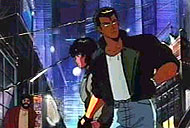
A.D. Police
It is unlikely one would be a fan of anime for very long without hearing of the seminal title Bubblegum Crisis. Its original incarnation set a base standard for all cyberpunk stories to follow, and though it wasn't perfect (and sometimes was downright boring), it quickly became a fan favorite with a cult following. Its popularity has spawned several different programs, including a retelling of the story called Bubblegum Crisis: Tokyo 2040. However, a direct spin-off of the show was the bleak A.D. Police, which featured the squad that was rival and help to the Knight Sabers in their battles with the robotic Boomers.
If Bubblegum Crisis is comparable to the action and flash (and maybe a tenth of the silliness) of Luc Besson's The Fifth Element, then A.D. Police is equivalent to Kathryn Bigelow's Strange Days. Brutal, dark, sexually charged and surprisingly violent, A.D. Police is not a typical title I would recommend. However, it's aged astoundingly well for a show from 1990, and some of the shock value it had back then has worn off, making the story more powerful. Aside from the weak first episode, this show is not only well animated but also surprisingly deep, and my opinion of it has actually gone up on repeat viewing.
The three episodes of A.D. Police take place five years before the events of the original Bubblegum Crisis, long before the Knight Sabers appeared on the scene. Here, this special unit is just starting to deal with the complications of a society living with humanoid robots that sometimes go berserk, as well as men and women who'd received so many bionic replacement parts that they barely qualified as humans themselves. Each episode follows a particular member of the force.
In the first episode, Leon McNichol finds himself caught in a game of deja vu when a humanoid he'd taken down months before comes back to haunt him when its replacement parts get used in other illegal robots. The second takes us into the life of Iris. She's tracking down a serial killer who's been gutting prostitutes on an old subway line called the Paradise Loop, which is frequented by women of the night. Iris finds a mysterious connection between the murders and a woman who's had much of her body replaced by cybernetics...a link that becomes difficult when Iris has to contemplate having replacement surgery herself. Finally, the third episode takes us into the second life of fallen police officer Billy Fanword. Mortally wounded in an incident with a Boomer, he's been remade into a grim mockery of Robocop, where only his brain and his tongue remain from his original body. Billy becomes more and more unstable as he realizes that he is impervious to pain, but that the physical sensations such as pain that he lost were what made him truly alive. Gina, another cop on the force and Billy's former lover, desperately tries to connect with him before he becomes nothing more than a ghost in the machine.
In one respect, A.D. Police abandons a lot of its built-in lead audience from Bubblegum Crisis by being incredibly violent. The gore quotient in these OVAs is extremely high. Also, the character designs from BGC are gone, replaced by likable enough work but very different from Kenichi Sonoda's cute-as-a-button models. The animation itself is quite good, though, and so those not expecting to see more of the same from BGC will likely be pleased. However, that show's fans may be in for a shock all around.
What's fascinating to me is how much better this series plays now than when I saw it back in the early '90s. Whereas sprightly J-Pop music and inconsistent direction has significantly dated the original Bubblegum Crisis, A.D. Police has improved with age. To be honest, the first episode still does little for me; it never becomes much more than an extended violent chase sequence with little meaning. It's the weakness of this episode, in fact, that keeps the series from getting any sort of "A" grade. However, the second episode really toys with the audiences' emotions about the meaning of humanity itself, and this theme extends throughout the third episode. Ghost in the Shell has become the standard bearer in the anime realm for thoughtful discussion on the nature of man in a cyberpunk world, but it's far too dull and too untrue to its source material to work for me. In comparison, though A.D. Police gets a little too graphic at times, it talks about these same concepts while keeping the audience riveted. After re-watching these, I've got an interest in the new A.D. Police TV series that's recently been released.
If you're ready for a dark, often twisted journey into the underbelly of society to discover a bit more of what it means to truly be human, A.D. Police delivers. The squeamish and the easily offended need not apply to this department, and I wouldn't advise the program for anyone younger than late teens. However, for adults who actually want a side of intellectual thought along with a large helping of action, you should take a gander at the A.D. Police files.
A.D. Police -- graphic violence, nudity/explicit situations, disturbing imagery -- B+

